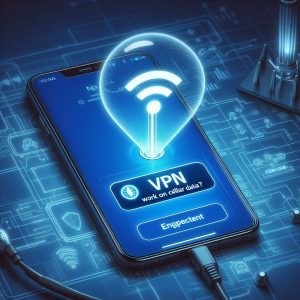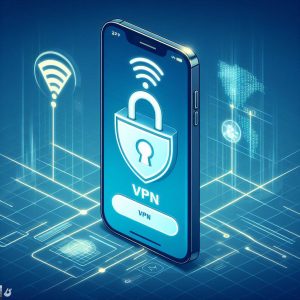Introduction
Virtual private networks (VPNs) have become an essential tool for protecting one’s privacy and security online. As mobile devices proliferate and cellular networks continue improving speeds, using a VPN on mobile data offers clear benefits. But how reliably can VPN encryption function when running on 3G, 4G LTE, or 5G cellular connections? This article will analyze the effectiveness, pros, cons, protocols choices, and limitations to using VPN services over cellular data.
Importance of VPNs on Cellular Networks
Cellular networks present easier avenues for user tracking and data interception versus WiFi. Internet traffic must traverse carrier infrastructure which identities devices by unique identifiers like IMEI numbers. Law enforcement also taps into carriers more easily under legal warrants and subpoenas. This reduces privacy protections.
Additionally, public WiFi typically encrypts data making passive sniffing difficult. But cellular protocols can still transmit data openly allowing easier capture by fake base stations and stingrays. VPNs provide requisite encryption to harden such vulnerabilities.
Brief Overview of How VPNs Work on Cellular Data
The basic mechanics behind establishing an encrypted VPN tunnel over mobile data versus WiFi remain unchanged. VPN client apps on devices negotiate secure connections with servers often located in foreign countries run by VPN providers.
This requires routing through the cellular network first before entering the public internet. Traffic then flows across the internet encrypted, exits through the provider’s server, and proceeds to its final destination.
This protects the data contents from the cellular carrier itself as well as actors on the global internet. Changing the connecting medium from WiFi to mobile data does not alter the fundamentals of how VPN protocols operate.
However, the limitations and constraints of mobile networks compared to generally less constrained WiFi networks impacts connectivity speeds and reliability which we will explore later on.

How VPNs Affect Mobile Data Usage
Running VPN services on cellular networks comes with data consumption tradeoffs that users should keep in mind depending on their plans and caps.
Increased Data Usage Due to Encryption Overhead
The encryption within VPN tunnels carries communication overhead that incrementally enlarges transmission sizes. On desktop OS platforms, the difference gets measured around 2 – 5% per session. But on mobile devices, the total usage bump climbs higher to between 4 – 20%.
That encompasses both the baseline encryption overhead as well as background connection maintenance traffic. Apps have to work harder across unreliable cellular networks to persist secure channels.
This data overhead total should not deter people from using mobile VPNs given the privacy importance. But tracking usage levels helps avoid unwanted overage fees depending on data limits.
Data Consumption Depending on VPN Protocol
Some VPN protocols push more data back-and-forth than others to keep sessions alive. Therefore the choice of mobile VPN protocol impacts cellular data consumption patterns. Protocols considered most data efficient include:
- WireGuard – Uses state-of-the-art cryptography that minimizes transmission overhead.
- OpenVPN (UDP) – Relies on fewer keep alive messages pushing less maintenance data.
- IKEv2 – Also utilizes efficient UDP packet tunnels thus consuming less idle data.
OpenVPN over TCP along with older IPSec systems feature notably higher overhead resulting in amplified mobile data usage levels.
So opting for a well-optimized VPN protocol provides ways to damper ballooning data costs when relying on cell signals.

Why Use a VPN on Cellular Networks?
There exist clear advantages from running VPN services on mobile devices using cellular data instead of traditional WiFi networks:
Accessing the Internet Via Mobile Data
People choose to access the internet directly through mobile data plans when:
- WiFi networks remain unreliable, insecure or completely unavailable in their usage environments.
- They travel locations lacking WiFi but need connectivity for critical activities like banking or work.
- Public WiFi portals create usage friction with sign-on processes or content restrictions.
In these cases, firing up the VPN over cellular data acts as a convenience to maintaining web access quickly and securely versus hunting for open or paid WiFi hotspots.
Bypassing Geo-blocking and Internet Censorship
Governments and content providers leverage IP address blocking techniques to limit access based on geographical location. However, VPN services assign IP addresses from their own server locations outside restricted regions.
So when cell phones run VPN tunnels through distant servers before reaching the web, geo-blocks get bypassed granting access to content previously unavailable. This works the same whether traversing cellular signals or tapping WiFi networks.
People similarly leverage VPN IP address masking effects for anonymously circumventing censorship firewalls when only cellular data proves accessible or if regimes restrict WiFi. Once VPN connections establish, banned sites and services get unlocked.
Enhancing Security and Privacy
Public WiFi presents massive security issues from man-in-the-middle attacks to simple unencrypted traffic sniffing. While cellular data also risks interception, it enjoys advantages around default encryption present on carriers versus open hotspots.
Running VPN services over mobile data adds an additional hardened tunnel. Even if cellular data gets intercepted, the VPN encryption protects contents rather than transmitting openly. VPNs also prevent cellular carriers themselves from directly viewing unencrypted web activity.
Therefore mobile VPNs provide essential privacy enhancements and reduce attack surfaces by removing insecure open WiFi from the equation when on the move.

VPN Protocols for Cellular Networks
Selecting high-performance VPN protocols purpose-built for cellular data should remain a priority when choosing mobile VPN services:
IKEv2 or IKEv2/IPSec as Top Choices
Internet Key Exchange version 2 represents the fastest and most resilient protocol across unreliable cellular networks. It utilizes UDP for efficiency while maintaining robust security protections like perfect forward secrecy and strong 256-bit AES encryption.
IKEv2 builds on modern IPsec VPN tunneling. Major platforms natively support both IKEv2 and IPsec allowing simplified client configurations. VPN providers offering either generally deliver better performance and persistence as users roam between cellular base stations.
Other Reliable Protocols Like WireGuard
WireGuard constitutes an emerging VPN protocol focused on speed, security, and simple cross-platform implementations. It employs state-of-the-art cryptography like Curve25519 for handshake exchanges and ChaCha20 for encryption.
These algorithms execute much faster than older standards while running securely on low-power mobile processors. WireGuard prioritizes resilient connections on cellular networks through concise keep-alive messages and connection migration.
While IKEv2 remains the top choice for the moment, WireGuard offers a modern alternative already providing reliable mobile VPN coverage with broader adoption forthcoming.
Limitations of Cellular Data VPNs
Despite the performance optimizations various VPN protocols employ, some inherent limitations around using VPNs on cellular networks remain:
Cannot Bypass Cellular Data Caps
Carriers implement monthly data caps and throttling on cellular plans meaning increased VPN overhead still counts against imposed limits. VPN encryption may reduce third-party tracking and censorship but does not help bypass data restrictions imposed by carriers themselves.
Users get protected from external threats but must vigilantly monitor consumption to avoid overages or speed downgrades after reaching caps. In some cases, disabling the VPN when not actively needed can help minimize cellular data accumulation.
Slightly Slower Connections Due to Encryption
Added VPN encryption tunnels increase processing strain when transiting cellular networks versus direct unprotected connections. This manifests in marginally higher latency and marginally lower bandwidth throughput.
Performance degradation generally measures under 10% depending on cellular signal strength. For strong 4G LTE and 5G connections, users will barely notice. But weaker cellular signals may compound VPN speed impacts.
Modern protocol choices like IKEv2 and WireGuard aim to minimize this tradeoff as much as possible while still applying encryption security.
Conclusion
Virtual private networks offer critical security and circumvention capabilities for mobile users that more than justify added cellular data consumption or minor speed decreases. Choosing VPN providers using robust protocols designed specifically for unreliable mobile networks ensures the most reliable connectivity.
IKEv2 and the emerging WireGuard standard rank as best-of-breed options today for maximizing cellular VPN performance. As carriers expand 5G availability, speeds should ameliorate VPN taxing effects even further. With mobile device usage continuing to overtake traditional computing, relying on cellular network VPNs will only increase in necessity moving forward.